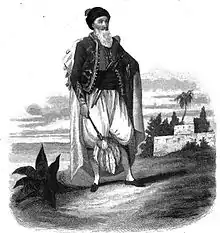Baba Mohammed ben-Osman
Baba Mohammed ben-Osman or Muhammad V ben Osman was Dey of the Deylik of Algiers from 1766 to 1791.The adoptive father of Baba Hassan Pacha and the grandfather of Mustapha Pacha. Under his rule he declared war against Denmark-Norway because he demanded that an annual payment to stave off piracy by Denmark-Norway should be increased, and he should receive new gifts. Denmark-Norway refused the demands, beginning the Danish-Algerian War.[1]
| Muhammad V | |||||
|---|---|---|---|---|---|
| Dey of Algiers | |||||
| Reign | 1766 – 1791 | ||||
| Predecessor | Baba Ali II Pasha | ||||
| Successor | Sidi Hassan | ||||
| Born | 1710 Algiers, Deylik of Algiers | ||||
| Died | 12 July 1791 (aged 80–81) Algiers, Deylik of Algiers | ||||
| Issue | Sidi Hassan (Adopted son, nephew) Brahim ben Mohammed (Son) Mustapha ben Brahim (Grandson) | ||||
| |||||

Beginning in administration and as minister
Having learned to read and write, he became khodja (secretary) after having bought his office in the state for the sum of 1000 pieces. He practiced with various garrisons before being promoted to the personal guard of the dey's palace Then he became Khaznadji (Prime Minister and Treasurer) of Dey Baba Ali who then designates him as his successor.[2]
Restoration of the prestige of the Regency outside
He succeeded the Dey Baba Ali in 1766. Spain tried to establish a peace with the Regency; these negotiations only resulted in an exchange of captives between November 1768 and February 1769.[3] Mohamed Ben Osman declared war on Denmark-Norway in 1770 and pushed a Danish attack on Algiers in 1772,[4] and notably imposed on United Kingdom, the United States and the Kingdom of the Two Sicilies the payment of maritime tribute.[5] However, following this period of calm, the Algerian corsair activities intensify and cause distress on the southern shores of Spain and partially disrupt its maritime traffic. The Spanish were therefore trying the Limpieza del Mar operation to try to end this corsair presence in the Western Mediterranean, without success. In 1775, Alejandro O'Reilly was sent to the head of an armada to take Algiers. Dey Mohamed Ben Othmane inflicts them a heavy defeat in the vicinity of El Harrach. In 1776, he appointed as Wakil al Kharadj (Minister for Foreign Affairs), Sidi Hassan who will open with his counterpart Floridablanca a period of rapprochement between the governments of Algiers and Madrid.[3]
However a peace with Spain is not to the advantage of the dey; piracy earns a lot of income and asking for the release of a captive may even be perceived in Algiers as a humiliation. With the diplomacy over, he finds the pretext of the lack of peace between the Ottoman Empire and Spain, and invites the latter to make peace with the Empire before negotiating with himself to save time and avoid asking for peace in Spain. In fact, even the Ottoman Sultan categorically refuses to interfere in the affairs of these regencies "considered as independent states".[3] The Spaniards finally get a firman (a recommendation) to the Regencies of North Africa, that the dey Mohamed Ben Othmane had already planned to reject. Indeed, apart from the spiritual connection (the Ottoman sultan is considered caliph and possessor of the holy places of Islam), at the time of Mohamed Ben Othmane, the Regency managed its internal and external affairs independently.[3]
Then King Charles III of Spain decided to declare war again. He sent squads to bomb Algiers between 1783 and 1784 to impose peace. Having found that the Sublime Porte had no authority over Algiers, the Madrid cabinet sought a direct way to negotiate peace. The negotiations were difficult and on June 16, 1785 a peace agreement was concluded. Dey Mohamed Ben Othmane demanded in the peace talks a compensation of 1,000,000 pesos for the various expeditions.[6] The members of the Diwan of Algiers (assembly) also obtained the attribution of the present diplomats.[3]
Domestic policy
On a national level, his reign, the longest of all the deys, was marked by stability. In the management of the affairs he manifested a great sense of the state.[4] He was busy recovering Oran and Mers el Kebir under Spanish tutelage. He appointed an energetic Bey in the west, Mohamed el Kebir, whom he instructs to take these two places.[6] He also carried out successful campaigns to pacify the hinterland.[5] He was also able to face the rise of Constantinois where he named another illustrious Bey Salah Bey ben Mostefa in 1771.[4] He died on July 12, 1791 and was replaced by his Khaznadji (Prime Minister) and his adopted son Sidi Hassan.[6]
References
- "Krigen mod Algier". natmus.dk (in Danish). National Museum of Denmark. Archived from the original on 2017-09-04. Retrieved 2017-03-09.
- Kaddache 2011, pp. 69–70.
- "RELATIONS ENTRE ALGER ET CONSTANTINOPLE SOUS LA GOUVERNEMENT DU DEY MOHAMMED BEN OTHMANE PACHA ( ), SELON LES SOURCES ESPAGNOLES". docplayer.fr (in French). Retrieved 25 May 2019.
- Kaddache 2011, p. 436.
- Naylor, Phillip C. (7 May 2015). Rowman & Littlefield (ed.). Historical Dictionary of Algeria. ISBN 9780810879195. Retrieved 25 May 2019.
- Terki Hassaine, Ismet (30 June 2004). "Oran au xviiie siècle : du désarroi à la clairvoyance politique de l'Espagne". Insaniyat / إنسانيات (in French). Insaniyat / إنسانيات. Revue algérienne d'anthropologie et de sciences sociales (23–24): 197–222. doi:10.4000/insaniyat.5625. ISSN 1111-2050. Retrieved 25 May 2019.
Bibliography
- Kaddache, Mahfoud (2011) [1982]. Société nationale d'édition et de diffusion (ed.). L'Algérie des Algériens (in French) (EDIF2000 ed.). Algiers. ISBN 978-9961-9662-1-1.